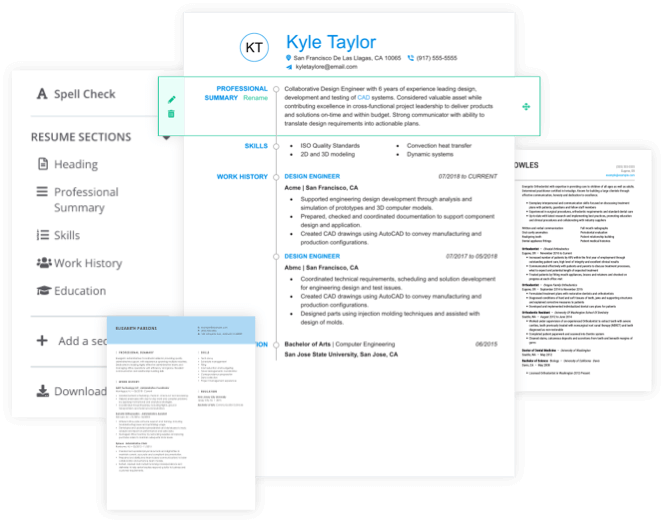![]()
Maintenance managers are responsible for the overall maintenance of their employer’s business or operation. They oversee all aspects of the maintenance process, from installation and upkeep to inspection and repair, often assuming a hands-on role in one or more stages of the process. The supervisory demands of this position require strong leadership skills, including the ability to effectively delegate tasks and assignments. Due to the nature of the position, maintenance managers are traditionally required to work on-site, and full-time hours can vary depending on the specifics of employment. As a supervisor, maintenance managers often oversee a team of subordinates and answer directly to their employer or other senior members of the organization.
If you are having writers block, our resume examples can help. Choose from hundreds of job titles to find the right example for your needs.
One extra step to impress a manager: A growing number of hiring professionals read cover letters to determine whether they’ll interview a candidate or not. Use our cover letter templates to craft a complete application that lands you the interview.


Job duties for maintenance managers vary depending on the employer, the nature of the organization, and the overall team size. However, there are several core tasks commonly associated with the position, including:
Above all else, maintenance managers must ensure the proper maintenance of their employer's business. To that end, a successful maintenance manager must develop and maintain a plan that ensures optimal operational effectiveness. In other words: keep things running smoothly and error-free. Such a plan requires an analytical mindset, the ability to forecast challenges, effective scheduling, and a talent for budgeting both time and labor.
As a supervisor, maintenance managers are responsible for assigning tasks and delegating responsibilities. The nature of these assignments will vary depending on job specifics, but each task will serve some aspect of overall system maintenance - from simpler jobs like general custodial work to more complex assignments involving advanced mechanical operations.
To ensure operational effectiveness and compliance with company standards, the maintenance manager trains their team on best practices and reviews and evaluates their subordinates' performances for continued success.
Depending on their team's size and assignment, maintenance managers often assist in one or more maintenance tasks. Performing these tasks can be for training purposes, as a demonstration, or simply one of the responsibilities of the position.
Communication is a big part of a maintenance manager's daily workflow. Whether it's reporting to superiors, coordinating with vendors and contractors, or conferring with peers and other supervisors, a maintenance manager is responsible for communicating effectively with all parties in a manner that addresses all concerns and inquiries.
The ideal maintenance manager possesses a strong technical background, an analytical mind, and is comfortable leading a team. Maintenance managers commonly hold a bachelor’s degree in engineering and have some measure of relevant work experience. However, depending on the employer and nature of the operation, extensive work experience can suffice in lieu of an advanced degree. Employers commonly prioritize candidates who display the following abilities:
A bachelor’s degree in engineering or an equivalent field is often required for employment. However, relevant work experience or a combination of experience and education can suffice in lieu of a degree.
The Bureau of Labor Statistics (BLS) lists maintenance managers under the broader category of first-line supervisors of mechanics, installers, and repairers, and reports the most current median annual salary as $68,120 (or $32.75 per hour). These numbers are consistent with salaries offered for maintenance managers on multiple job sites and career boards. According to the BLS, maintenance managers in the 10th percentile earn $39,310 per year, while the highest-paid managers make an average of $102,350 per year.
BLS data suggests employment in this sector should grow 8 percent through 2026. Because of the varying scope of this job title and the many fields it can apply to, that growth could end up being marginally less, but should remain above 5 percent regardless of industry.
Try our resume builder today

Thinking about starting your career as a maintenance manager? Check out the resources below for some additional information:
from maintenance professional Joel Levitt, this comprehensive resource introduces and explains the fundamentals of maintenance management. Included in this 455page handbook are a complete survey of the maintenance field, a manual for cost reduction, and a training regimen for new supervisors and managers
based on realworld experiences, this valuable reference provides a detailed approach to the entire maintenance planning process, from start to finish. Maintenance professionals Don Nyman and Joel Levitt Author thoroughly examine all stages of maintenance preparation from job scoping to labor estimates in order to provide you with a complete walkthrough of the process
from internationally recognized expert John C. Maxwell, this guide will sharpen your leadership tools and make you a more effective manager. Although not focused on maintenance per se, this book provides the tools, methods, and best practices managers in any field can apply to improve their overall leadership ability
this reference touches on several common maintenance topics, including structural, mechanical, and electrical maintenance, to name a few. Author Thomas Westerkamp walks you through each area, touching on different types of maintenance as well as other key aspects of the job, including planning and budget forecasting